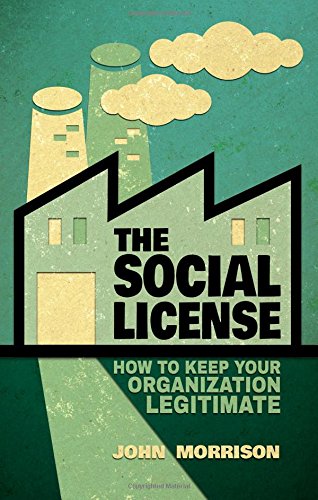John Morrison’s new book raises important questions about how we structure the relationship between companies, governments and wider society
Concepts such as corporate responsibility (CSR), corporate citizenship, the triple bottom line and the social licence to operate have all had a strikingly similar history. They have started with a burst of enthusiasm about their potential to redefine the relationship between business and society. Once the concept has gained some support among opinion formers and the media, companies try to interpret the term in a way that can be understood and implemented by business.
This usually sees the concept defined in terms of the systems and process that companies need to have in place, the costs and benefits of action to the business, and the prioritisation of those areas where there is a clear business case for action. Inevitably, when it becomes clear that the original vision will not be delivered, the search begins for the next big idea that, this time, will definitely reshape the relationship between companies and society.
It is in this context of the constant search for the next big idea in corporate responsibility that John Morrison’s new book – The Social License: How to Keep Your Organization Legitimate – is so important. Rather than trying to develop a new concept, he simply takes the idea of the social licence to operate (a term widely used in the extractive industries) and asks what this might look like if it was analysed in terms of the “social contract” between business and society.
He states that “The social license relates to the activities of any organization and might be defined in relation to an organization’s legitimacy in the eyes of society (and the legitimacy of the related activity), the trust stakeholders have in it as well as the consent granted for specific activities by rights-holders”. He goes on to argue that the social licence cannot be directly managed or self-awarded, but rather that it is based on a number of factors: the delivery of sufficiently positive outcomes for all concerned, the quality of the measures adopted to tackle imbalances of power, the quality of the measures adopted to protect victims and ensure justice.
So what might it look like in practice? In relation to companies, John suggests that a social licence to operate would require companies to deliver real value in financial and in social terms, to demonstrate an understanding of the true social impacts of the business and of the different needs of shareholders, stakeholders and rights-holders, to run an efficient business, to have appropriate and credible corporate governance and accountability processes, and to have an explicit commitment to paying enough tax (and in the right place!).
In relation to specific activities, in particular those that impose significant risks or impacts on wider society, the social licence to operate would require companies to have adequate due diligence processes, to provide adequate remedies in the event of negative impacts, and to provide appropriate levels of transparency and disclosure. These lists will be familiar to many working in the area of corporate responsibility, although it is worth acknowledging that few companies can be considered to have made significant progress on more than one or two of these.
The more interesting argument in The Social License is that the social contract implies that all parties have responsibilities, not just companies. If we take the example of the BP Deepwater Horizon spill, one of the main case-studies considered in the book, it is clear that BP’s problems were compounded and magnified by the social, political, and legal context of the USA. In fact, it could be argued that level of damages to be paid by BP has relatively little to do with the severity of the impacts and much more to do with the specific details of who was affected, the ability of these individuals to seek redress (John draws some chilling parallels between Deepwater Horizon and Bhopal to illustrate this point) and the balance sheet of the company involved.
The social contracts approach to the assessment and management of risk suggests that there may be other ways of defining responsibilities and assigning liabilities when accidents occur. For example, multi-stakeholder processes may be established to tackle some of these issues. John points to the Voluntary Principles on Security and Human Rights and the Extractive Industries Transparency Initiative as possible models. He does, however, also acknowledge that similar processes have yet to be established for other activities in the oil and gas sector (e.g. fracking, tar sands, Arctic drilling, deep water exploration and production) that present major risks to and impact on society and the environment.
So where does that leave us? Unless and until the social contract gains greater traction, I suspect we will stay where we are. That is, given the penalties for getting it wrong, we should not be surprised when concepts such as CSR, shared value, the social licence to operate and the next generation of these terms all ended up being defensive, risk management tools rather than signalling a new relationship (or contract) between business and society.
John Morrison (2014), The Social License: How to Keep Your Organization Legitimate (Palgrave Macmillan).

Dr Rory Sullivan is an internationally recognised expert on responsible investment and a member of the Ethical Corporation advisory board.
book review CSR books
